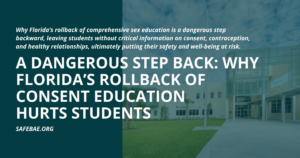A Dangerous Step Back: Why Florida’s Rollback of Consent Education Hurts Students
Why Florida’s rollback of comprehensive sex education is a dangerous step backward, leaving students without critical information on consent, contraception, and healthy relationships, ultimately putting their safety and well-being at risk.
by Ella O’Neal
The Reality of Cutting Comprehensive Sex Education
Florida’s recent decision to scale back comprehensive sex education is more than just a policy shift—it’s a dangerous regression that puts young people at risk. By focusing on abstinence-only “education” and cutting critical lessons on consent, contraception, and healthy relationships, state officials are turning a blind eye to what research and common sense have long told us: students need comprehensive, accurate information to make safe, informed choices.
The Harm of Abstinence-Only “Sex Ed”
Decades of research have shown that abstinence-only programs are not just ineffective—they can be outright harmful. Without comprehensive education, young people are left in the dark about how to protect themselves from sexually transmitted infections (STIs), unintended pregnancies, and unhealthy relationships. This approach often promotes shame and stigma, making teens feel confused and unprepared instead of equipping them with the tools they need to navigate their sexual health and relationships safely.
Abstinence-only programs often omit critical information about contraception and disease prevention, leaving young people without the knowledge to make informed decisions. Studies like Santelli et al. (2017) have found that these programs do not delay the initiation of sexual activity, reduce the number of sexual partners, or decrease rates of STIs and pregnancies. States that emphasize abstinence-only education frequently experience higher rates of teen pregnancies and STIs. For example, the Guttmacher Institute (2016) highlighted that comprehensive sex education is associated with reduced rates of these outcomes because it equips teens with the knowledge and skills to make safer choices.
One particularly troubling consequence of abstinence-only education is its impact on sexual violence. Stanger-Hall and Hall (2011) found that states with abstinence-only education had significantly higher rates of teen pregnancy, as well as increased instances of sexual violence, compared to states with comprehensive sex education. The lack of education around consent, boundaries, and healthy relationships leaves students more vulnerable to coercion and abuse because they are not equipped with the tools to recognize or prevent such situations. Without understanding what constitutes healthy and respectful interactions, students may struggle to identify and resist coercive behavior, increasing their risk of victimization.
Comprehensive education, on the other hand, has been shown to delay sexual initiation and reduce risky behaviors. Kohler, Manhart, & Lafferty (2008) demonstrated that teens receiving comprehensive sex education were more likely to delay sexual activity and use contraception compared to those receiving abstinence-only education.
When young people are provided with accurate information, their curiosity about sex is often reduced, and they are better prepared to make responsible decisions. Comprehensive sex education fosters a healthy understanding of relationships and sexuality, promoting respect and safety—outcomes that abstinence-only education simply cannot achieve.
Why Conservative States Are Rolling Back Comprehensive Sex Education
The push to scale back sex education in conservative states is often framed as a way to “protect” young children from inappropriate content. Critics argue that topics like consent, LGBTQ+ inclusivity, and contraception are too mature for students, using scare tactics to suggest that schools are teaching explicit material to children. In reality, comprehensive sex education can and should be introduced in age-appropriate ways, tailored to the developmental stage of each grade level.
This fear-mongering often ignores the fact that effective sex education isn’t about exposing young children to explicit information, but about teaching them the basics of respect, consent, and body autonomy. For younger grades, this might mean simply learning to identify their feelings and understand personal boundaries—crucial lessons that lay the foundation for healthy relationships as they grow older.
For many in older generations, these changes are challenging to accept, and this resistance may stem from their own lack of education or unresolved traumas around these topics. The discomfort around discussing sexual health in schools is understandable, but the solution isn’t to avoid the conversation altogether. Instead, it’s about finding the right way to approach these topics so that they are informative, supportive, and—most importantly—age-appropriate.
At its core, the resistance to comprehensive sex education is often fueled by fear and misunderstanding. By framing the issue as one of protecting children from inappropriate content, opponents sidestep the real goal of these programs: to empower young people with the knowledge and skills they need to make safe, informed choices. Comprehensive sex education isn’t about encouraging sexual activity—it’s about ensuring that when the time comes, young people are prepared, informed, and able to navigate their own relationships safely and respectfully.
Why Schools Must Fill the Gap
A common argument against comprehensive sex education in schools is that these topics should be taught by parents at home. While this may sound reasonable on the surface, it’s a perspective rooted in privilege. Not all children have parents who are willing, knowledgeable, or even present enough to provide this crucial education. Some families face cultural, religious, or personal barriers that prevent open discussions about sexual health. For many students, school is the only place they can access accurate, unbiased information about their bodies, relationships, and safety.
Relying solely on parents assumes that every child has an ideal home environment, where parents are both equipped and comfortable discussing complex issues like consent, healthy relationships, and contraception. But the reality is that many parents lack the resources or feel unprepared to address these topics. This is where schools play an essential role. Comprehensive sex education provided in schools ensures that all students, regardless of their background, have access to the knowledge they need to protect themselves and make informed choices.
By rolling back these programs, we’re not just limiting information—we’re actively creating inequity. We’re leaving the most vulnerable students, who may already face challenges at home, without the critical support and education they need. Providing comprehensive sex education in schools is about more than just teaching facts; it’s about ensuring every child has the opportunity to grow up safe, informed, and empowered.
Customized Prevention Programming for Every School
As debates over sex education continue, conservative schools may feel hesitant to embrace comprehensive programming. But the reality is, SafeBAE’s approach is flexible and can be tailored to meet the unique needs of any community, including those with religious affiliations, single-gender schools, or schools with specific cultural considerations. Our programming has been successfully implemented in some of the most elite schools in the country, where we’ve worked closely with administrators to ensure that content aligns with their values while still providing essential education on consent, healthy relationships, and sexual safety.
Consent education in conservative settings can help young students set their own personal boundaries and reinforce refusal skills around their own individually set personal boundaries. By choosing SafeBAE, schools don’t have to sacrifice their principles to protect their students. Instead, they gain a partner committed to working with them to create a curriculum that fits their specific needs. Whether it’s focusing on peer-led initiatives or adapting discussions to suit a single-gender environment, SafeBAE’s programs can be customized to foster safe, supportive school climates without compromising on educational quality.
Now more than ever, it’s crucial for every school to have a proactive approach to preventing sexual violence and fostering healthy relationships. We invite schools of all backgrounds to explore how SafeBAE can be a valuable partner in this mission. Let’s work together to provide students with the knowledge and confidence they need to navigate their lives safely and respectfully.
If you’re ready to learn more about how SafeBAE can tailor its programs to fit your school’s unique needs, please reach out directly to shael@safebae.org.
Together, we can create a safer, more supportive environment for every student, no matter where they come from.


